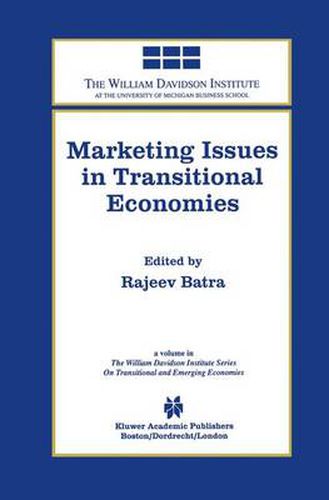Readings Newsletter
Become a Readings Member to make your shopping experience even easier.
Sign in or sign up for free!
You’re not far away from qualifying for FREE standard shipping within Australia
You’ve qualified for FREE standard shipping within Australia
The cart is loading…






This title is printed to order. This book may have been self-published. If so, we cannot guarantee the quality of the content. In the main most books will have gone through the editing process however some may not. We therefore suggest that you be aware of this before ordering this book. If in doubt check either the author or publisher’s details as we are unable to accept any returns unless they are faulty. Please contact us if you have any questions.
As the markets in transitional economies open and grow, major challenges and opportunities arise for multinational firms entering these markets, local firms facing these new competitors, and policymakers seeking to increase the ability of all firms to compete fairly and efficiently. Yet despite the important questions transition economies pose for policymakers and companies seeking to enter and compete in these new markets, there has been a relative absence of systematic research on these concerns.
This book seeks to fill a gap in the existing literature by offering a pioneering and comprehensive examination of issues that have developed as markets in transitional economies become more deregulated and open. The countries discussed include China, the Czech Republic, Hungary, India, Poland, Romania, Russia, South Africa and South Korea. The topics covered are divided into five main sections, and the individual chapters are written by some of the world’s leading academic experts on these issues. Most of the authors draw from freshly-collected data in new studies of consumers and/or firms in transitional economies. After an opening section which discusses the marketing issues and challenges multinational and local firms face in transitional economies, the next three sections offer detailed treatments of changing consumer behavior, measuring and improving the marketing orientation of firms, and implementing and managing distribution channels. The fifth and final section is devoted to firm strategies and tactics, examined variously from the perspective of multinational firms entering these new markets, from the viewpoint of existing local firms facing new competitive challenges from global entrants, and from the perspective of local firms seeking to establish themselves in foreign markets where they have not previously competed.
Most of the individual chapters are revised versions of papers originally presented at a conference sponsored by the William Davidson Institute, which focuses on research related to emerging and transitional economies, and have not previously appeared in published form. Thus, the book is a unique collection of cutting-edge scholarship on the various aspects of marketing in transitional economies. It will prove valuable reading to academics, policymakers, and international business strategists.
$9.00 standard shipping within Australia
FREE standard shipping within Australia for orders over $100.00
Express & International shipping calculated at checkout
This title is printed to order. This book may have been self-published. If so, we cannot guarantee the quality of the content. In the main most books will have gone through the editing process however some may not. We therefore suggest that you be aware of this before ordering this book. If in doubt check either the author or publisher’s details as we are unable to accept any returns unless they are faulty. Please contact us if you have any questions.
As the markets in transitional economies open and grow, major challenges and opportunities arise for multinational firms entering these markets, local firms facing these new competitors, and policymakers seeking to increase the ability of all firms to compete fairly and efficiently. Yet despite the important questions transition economies pose for policymakers and companies seeking to enter and compete in these new markets, there has been a relative absence of systematic research on these concerns.
This book seeks to fill a gap in the existing literature by offering a pioneering and comprehensive examination of issues that have developed as markets in transitional economies become more deregulated and open. The countries discussed include China, the Czech Republic, Hungary, India, Poland, Romania, Russia, South Africa and South Korea. The topics covered are divided into five main sections, and the individual chapters are written by some of the world’s leading academic experts on these issues. Most of the authors draw from freshly-collected data in new studies of consumers and/or firms in transitional economies. After an opening section which discusses the marketing issues and challenges multinational and local firms face in transitional economies, the next three sections offer detailed treatments of changing consumer behavior, measuring and improving the marketing orientation of firms, and implementing and managing distribution channels. The fifth and final section is devoted to firm strategies and tactics, examined variously from the perspective of multinational firms entering these new markets, from the viewpoint of existing local firms facing new competitive challenges from global entrants, and from the perspective of local firms seeking to establish themselves in foreign markets where they have not previously competed.
Most of the individual chapters are revised versions of papers originally presented at a conference sponsored by the William Davidson Institute, which focuses on research related to emerging and transitional economies, and have not previously appeared in published form. Thus, the book is a unique collection of cutting-edge scholarship on the various aspects of marketing in transitional economies. It will prove valuable reading to academics, policymakers, and international business strategists.